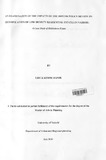| dc.description.abstract | Densification of low density residential areas is practiced worldwide to counter the outward spread of cities and to offset the negative effects caused by this spread. Some of the negative effects include; air pollution due to increased use of the motor car, the loss of agricultural fertile land to urban uses, encroachment into environmental sensitive land leading to loss of biodiversity, contamination of water bodies and the increased costs of providing infrastructure to the scattered settlements.
But densification brings with it numerous challenges especially when the infrastructure is not upgraded commensurate with the increased population including; waters shortages, blocked sewers, traffic congestion, invasion of road reserves and other available opens spaces among others.
This study focused on a policy review conducted in 2005/2006 by the City Council of Nairobi and other stake holders to address the negative effects of densification on former low density residential estates. It aimed at examining the impacts of the policy review on the Kileleshwa estate; based on the examinations recommend strategic policy interventions towards a better Kileleshwa estate and to ensure that densification in future is done with adequate consideration given to the available infrastructure and the carrying capacity of other existing facilities.
The study findings indicate that the 2005/2006 policy review failed to alleviate the negative effects of densification in Kileleshwa estate. Challenges of water shortages, blocked sewer, traffic congestion, loss of privacy and setting up businesses outside the designated commercial centres among other challenges still exist in the estate. The policy intervention managed to create sub-planning zones from the former larger planning zones that could be used as an entry point to address various issues of development control. | en |

